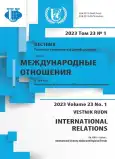Chinese Media Representation of the SCO: A Study of People’s Daily and Global Times
- Авторлар: Krivokhizh S.V.1, Soboleva E.D.1, Melnikova E.S.1
-
Мекемелер:
- Higher School of Economics
- Шығарылым: Том 23, № 1 (2023): International Security: Global and Regional Trends
- Беттер: 105-115
- Бөлім: APPLIED ANALYSYS
- URL: https://journal-vniispk.ru/2313-0660/article/view/320497
- DOI: https://doi.org/10.22363/2313-0660-2023-23-1-105-115
- EDN: https://elibrary.ru/ULEZQK
- ID: 320497
Дәйексөз келтіру
Аннотация
The Shanghai Cooperation Organization (SCO) is one of the first international organizations in which the PRC played a key role. However, according to some researchers, over the past 20 years the Chinese leadership’s interest in this mechanism of international cooperation has decreased. This article explores the place of the SCO in Chinese foreign policy by analyzing the representation of this organization in the PRC’s media - Chinese-language publications in the newspapers People’s Daily and Global Times , which both belong to the Chinese Communist Party. Such focus allows better understanding the value of the SCO to China and its position vis-á-vis other Chinese initiatives in Central Asia. The authors use methods of quantitative and qualitative content analysis, namely counting the frequency of single words, identifying and counting the most common frames, and discussing the ways these frames are constructed. Frame analysis demonstrates that the articles focus on the achievements of the SCO in solving regional problems, while existing difficulties are ignored. The SCO is represented as an important element of China’s foreign policy, along with the Belt and Road Initiative, while the details of their interaction are not discussed. It should also be mentioned that the SCO is framed as an association of countries opposing Western hegemonism and advocating a new system of international relations. An extremely positive representation of the SCO serves legitimation of the political regime in the PRC: the articles focus on China’s role as a leader in the SCO and its successes in addressing domestic problems, such as poverty reduction and fighting the coronavirus infection. This narrative is often created by quoting the opinions of high-level foreign politicians and average citizens.
Негізгі сөздер
Авторлар туралы
Svetlana Krivokhizh
Higher School of Economics
Хат алмасуға жауапты Автор.
Email: skrivokhizh@hse.ru
ORCID iD: 0000-0003-0946-228X
PhD (History), Associate Professor, Institute of Asian and African Studies
Saint-Petersburg, Russian FederationElena Soboleva
Higher School of Economics
Email: edsoboleva@hse.ru
ORCID iD: 0000-0003-0525-2728
PhD (Freie Universität Berlin), Associate Professor, Institute of Asian and African Studies
Saint-Petersburg, Russian FederationEkaterina Melnikova
Higher School of Economics
Email: esmelnikova_2@edu.hse.ru
ORCID iD: 0000-0001-8284-1054
Student, Institute of Asian and African Studies
Saint-Petersburg, Russian FederationӘдебиет тізімі
- Alasuutari, P., Qadir, A., & Creutz, K. (2013). The domestication of foreign news: News stories related to the 2011 Egyptian revolution in British, Finnish and Pakistani newspapers. Media, Culture & Society, 35(6), 692-707. https://doi.org/10.1177/0163443713491299
- Burnell, P. (2006). Autocratic opening to democracy: Why legitimacy matters. Third World Quarterly, 27(4), 545-562. https://doi.org/10.1080/01436590600720710
- Cabestan, J.-P. (2013). The Shanghai Cooperation Organization, Central Asia, and the great powers, an introduction: One bed, different dreams? Asian Survey, 53(3), 423-435. https://doi.org/10.1525/as.2013.53.3.423
- Chen, Yixin, & Rowlands, I. H. (2022). The socio-political context of energy storage transition: Insights from a media analysis of Chinese newspapers. Energy Research & Social Science, 84, 1-14. https://doi.org/10.1016/j.erss.2021.102348
- Chung, Chien-peng. (2004). The Shanghai Co-operation Organization: China’s changing influence in Central Asia. The China Quarterly, (180), 989-1009.
- Clausen, L. (2004). Localizing the global: ‘Domestication’ processes in international news production. Media, Culture & Society, 26(1), 25-44. https://doi.org/10.1177/0163443704038203
- Cooper, A. F., & Zhang, Yanbing. (2017). Chinese leadership in the evolution of “hub” and “parallel” globally oriented institutions. Chinese Political Science Review, 3(1), 28-47. https://doi.org/10.1007/s41111-017-0081-z
- Denisov, I. E. (2015). Travel to the West. Russia in Global Affairs, 13(1), 135-143. (In Russian).
- Denisov, I. E., & Safranchuk, I. A. (2016). Four SCO enlargement problems. MGIMO Review of International Relations, 3(48), 112-122. (In Russian). https://doi.org/10.24833/2071-8160-2016-3-48-112-122
- Entman, R. (1993). Framing: Toward clarification of a fractured paradigm. Journal of Communication, 43(4), 51-58. https://doi.org/10.1111/j.1460-2466.1993.tb01304.x
- Holbig, H. (2011). International dimensions of legitimacy: Reflections on Western theories and the Chinese experience. Journal of Chinese Political Science, 16(2), 161-181. https://doi.org/10.1007/s11366-011-9142-6
- Hooijmaaijers, B. (2021). Understanding success and failure in establishing new multilateral development banks: The SCO Development Bank, the NDB, and the AIIB. Asian Perspective, 45(2), 445-467. https://doi.org/10.1353/apr.2021.0008
- Pak, M., Menga, F., Feuer, D., & Dowell, A. (2020). State-run media outlets in Central Asia: External regime legitimation through regional conflict and cooperation framing. Central Asian Survey, 39(3), 378-397. https://doi.org/10.1080/02634937.2020.1781060
- Shirk, S. (2007). Changing media, changing foreign policy in China. Japanese Journal of Political Science, 8(1), 43-70. https://doi.org/10.1017/S1468109907002472
- Soboleva, E., & Krivohizh, S. (2020). Leadership in the multipolar world: China’s strategy in Central Asia. International Trends, 18(1), 119-134. (In Russian). https://doi.org/10.17994/it.2020.18.1.60.7
- Steinbock, D. (2018). U.S. - China trade war and its global impacts. China Quarterly of International Strategic Studies, 4(4), 515-542. https://doi.org/10.1142/S2377740018500318
- Wang, Guofeng. (2020) Legitimization strategies in China’s official media: The 2018 vaccine scandal in China. Social Semiotics, 30(5), 685-698. https://doi.org/10.1080/10350330.2020.1766262
- Wu, Guoguang. (1994). Command communication: The politics of editorial formulation in the People’s Daily. The China Quarterly, (137), 194-211. https://doi.org/10.1017/S0305741000034111
- Zabella, A. A., Katkova, E. Yu., & Shabaga, A. V. (2021). Eurasian concept: Central Asia in Russian and Chinese foreign policy. Vestnik RUDN. International Relations, 21(1), 79-90. (In Russian). https://doi.org/10.22363/2313-0660-2021-21-1-79-90
- Zhao, Huasheng. (2013). China’s view of and expectations from the Shanghai Cooperation Organization. Asian Survey, 53(3), 436-460. https://doi.org/10.1525/as.2013.53.3.436
Қосымша файлдар









